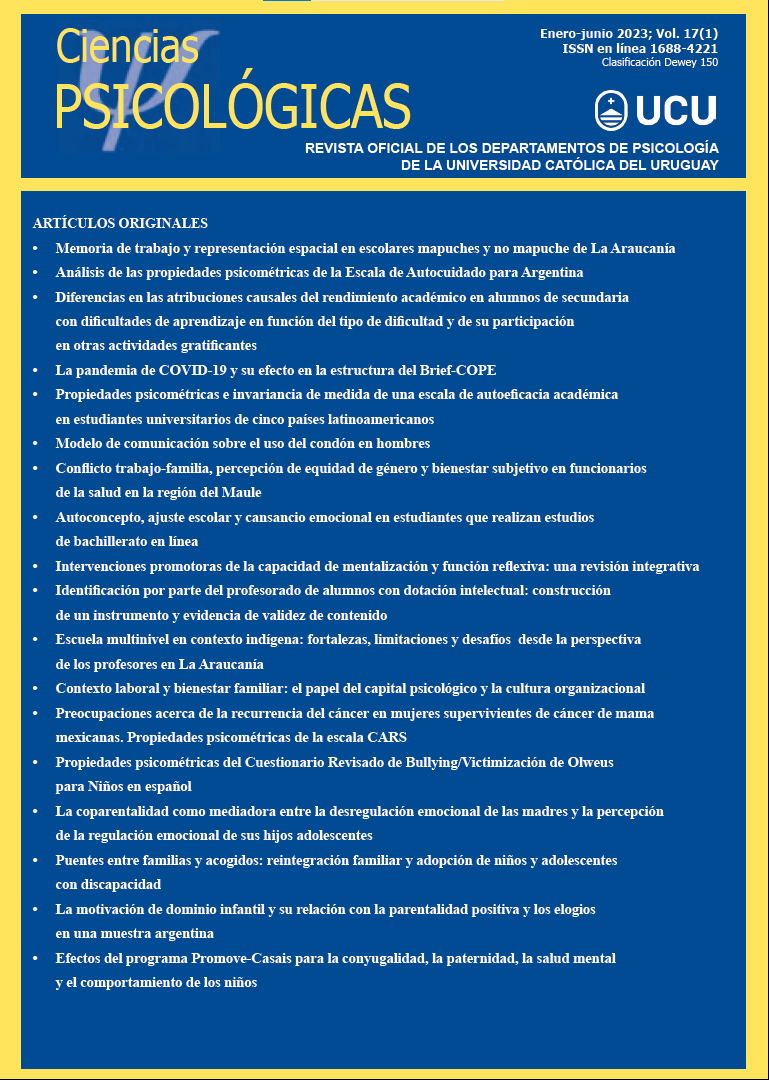Work context and family well-being: the role of psychological capital and the organizational culture
DOI:
https://doi.org/10.22235/cp.v17i1.2671Keywords:
job demands, job resources, family-work interface, family well-beingAbstract
Family-work conflict and enrichment are closely related processes. This study used the Work-Family Resources Model to investigate the direct effects of a demand (perceived work demands) and a contextual job resource (social support at work) on an outcome in the family (flourishing in the family), as well as the mediating role of a personal resource (positive psychological capital) and the moderating role of a macro resource (organizational culture associated with the employees’ values of satisfaction and wellbeing) in these relationships. The sample consisted of 1052 Brazilian workers of both sexes (72.5 % women) from 50 organizations. The results found in Multilevel Structural Equation Modeling provided empirical support for the model by confirming the relationships that were tested. These findings entail important theoretical and practical implications for the family-work relationship, in demonstrating how the different processes imbricated in the work-family interface can occur, and how they can contribute to the quality of life in the family context.
Downloads
References
Allen, T. D., Cho, E., & Meier, L. L. (2014). Work-family boundary dynamics. Annual Review of Organizational Psychology and Organizational Behavior, 1(1), 99-121. https://doi.org/10.1146/annurev-orgpsych-0314130091330
Azim, M. T., Fan, L., Uddin, M. A., Jilani, M. M. A. K., & Begum, S. (2019). Linking transformational leadership with employees’ engagement in the creative process. Management Research Review, 42, 837-858. https://doi.org/10.1108/mrr-08-2018-0286
Chan, X. W., Kalliath, P., Chan, C., & Kalliath, T. (2019). How does family support facilitate job satisfaction? Investigating the chain mediating effects of work–family enrichment and job‐related well‐being. Stress and Health, 36(1), 97-104. https://doi.org/10.1002/smi.2918
Diener, E., Wirtz, D., Tov, W., Kim-Prieto, C., Choi, D.W., Oishi, S., & Biswas-Diener, R. (2010). New well-being measures: Short scales to assess flourishing and positive and negative feelings. Social Indicators Research, 97(2), 143-156. https://doi.org/10.1007/s11205-009-9493-y
Ferreira, M. C. & Assmar, E. M. L. (2008). Cultura organizacional. In M. M. M. Siqueira (Ed.), Medidas do comportamento organizacional: Ferramentas de diagnóstico e de gestão (pp. 125-137). Artmed.
Ford, M., Wang, Y.-R., & Huh, Y. (2018). Work, the work-family interface, and subjective well-being. In E. Diener, S. Oishi, & L. Tay (Eds.), Handbook of well-being, (pp. 1-20). DEF Publishers.
Gabardo-Martins, L. M. D. & Ferreira, M. C. (2019). Propriedades psicométricas da Escala de Demandas Percebidas do Trabalho e da Família. Avaliação Psicológica, 18(3), 276-284. https://dx.doi.org/10.15689/ap.2019.1803.16152.07
Gabardo-Martins, L. M. D., Ferreira, M. C., & Valentini, F. (2017). Family resources and flourishing at work: The role of core self-evaluations. Paidéia (Ribeirão Preto), 27(68), 331-338. https://doi.org/ 10.1590/1982-43272768201711.
Gabardo-Martins, L. M. D., Ferreira, M. C., & Valentini, F. (2021). Testing the two directions of the work–family interface: a diary study. The Spanish Journal of Psychology, 24, E38. https://doi.org/10.1017/SJP.2021.36
Greenhaus, J. & Beutell, N. (1985). Sources of conflict between work and family roles. Academy of Management Review, 10(1), 76-88. https://doi.org/10.5465/AMR.1985.4277352
Greenhaus, J. & Powell, G. (2006). When work and family are allies: A theory of work-family enrichment. Academy of Management Review, 31(1), 72-92. https://doi.org/10.5465/AMR.2006.19379625
Instituto Brasileiro de Geografia e Estatística. (2020). Demografia das empresas. https://acortar.link/Fk4MEq
Jordan, P. J. & Troth, A. C. (2020). Common method bias in applied settings: The dilemma of researching in organizations. Australian Journal of Management, 45(1), 3-14. https://doi.org/10.1177/0312896219871976
Kamei, H., Ferreira, M. C., Valentini, F., Peres, M. F. P., Kamei, P. T., & Damásio, B. F. (2018). Psychological Capital Questionnaire - short version (PCQ-12): Evidence of validity of the Brazilian version. Psico-USF, 23(2), 203-214. https://doi.org/10.1590/1413-82712018230202
Keyes, C. L. M., Shmotkin, D., & Ryff, C. D. (2002). Optimizing well-being: The empirical encounter of two traditions. Journal of Personality and Social Psychology, 82(6), 1007-1022. https://doi.org/10.1037/0022-3514.82.6.1007
Kutty, S. R. S. (2018). Impact of working hours on family well-being, health, and lifestyle of women employees working in the It/Bpo sector. International Journal of Applied Research, 4(8), 164-175.
Luthans, F., Youssef, C. M. E., & Avolio, B. (2007). Psychological capital: Developing the Human Competitive Edge. Oxford University Press.
Mendonça, H., Caetano, A., Ferreira, M. C., Sousa, I. F., & Silva, A. J. (2014). Florescimento e afetos no trabalho. In M. M. M. Siqueira (Ed.), Novas medidas de comportamento organizacional: Ferramentas de diagnóstico e de gestão, (pp. 172-177). Artmed.
Saha, S. & Kumar, S. P. (2018). Organizational culture as a moderator between affective commitment and job satisfaction. International Journal of Public Sector Management, 31(2), 184-206. https://doi.org/ 10.1108/IJPSM-03-2017-0078
Skomorovsky, A., Hujaleh, F., & Wolejszo, S. (2015). Intimate partner violence in the Canadian armed forces: The role of family stress and its impact on well-being. Military Medicine, 180(7), 809-816. https://doi.org/ 10.7205/MILMED-D-14-00447
Tamayo, M. R., Pinheiro, F. A., Tróccoli, B. T., & Paz, M. G. T. (2000). Construção e validação da Escala de Suporte Organizacional Percebido (ESOP) [Abstract]. Anais da Reunião Anual da Sociedade Brasileira para o Progresso da Ciência, Sociedade Brasileira de Psicologia, p. 52.
Tement, S. (2014). The role of personal and key resources in the family-to-work enrichment process. Scandinavian Journal of Psychology, 55(5), 489-496. https://doi.org/10.1111/sjop.12146
Ten Brummelhuis, L. L. & Bakker, A. B. (2012). A resource perspective on the work-home interface: The Work-Home Resources Model. The American Psychologist, 67(7), 545-556. https://doi.org/10.1037/a0027974
Xia, Y. & Yang, Y. (2019). RMSEA, CFI, and TLI in structural equation modeling with ordered categorical data: The story they tell depends on the estimation methods. Behavior Research Methods, 51, 409-428. https://doi.org/10.3758/s13428-018-1055-2
Downloads
Published
How to Cite
Issue
Section
License
Copyright (c) 2023 Universidad Católica del Uruguay

This work is licensed under a Creative Commons Attribution 4.0 International License.
















